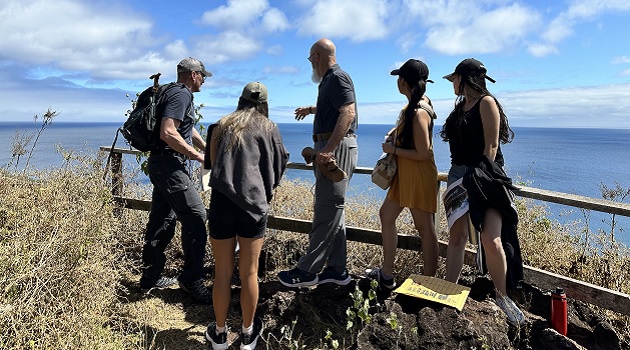How the City of Sumter, South Carolina is serving as a model for the rest of the world
By W. Thomas Smith Jr.
SOUTH CAROLINA HAS BECOME AN EXAMPLE, GLOBALLY, of environmental conservation-leadership, what with the Palmetto State’s having already placed some 3.5 million acres of a total 20.5. million acres under a level of conservation protection. And Gov. Henry McMaster and other legislative leaders are increasingly expressing interest in conserving as much as 10 million acres across the state.
One successful element of that conservation protection effort has been that of the Shot Pouch Greenway project in the City of Sumter, and one of the state’s – more specifically Sumter’s – conservation leaders in this regard has been retired U.S. Army Col. Jason Stoddard.
So when Stoddard agreed to join S.C. Floodwater Commission Chairman and university professor Dr. Tom Mullikin in the famed Galápagos Islands (where Mullikin teaches Climate Change and Ecotourism), Mullikin welcomed him with open arms.
Before a gathering of students and faculty of the Universidad of San Francisco Quito (USFQ) overlooking the Galapagos’ Darwin Bay, Stoddard explained “the unique value” of the Shot Pouch Greenway, a 3.1-mile pedestrian greenway that connects the City of Sumter vertically from Dillon Park in the north to Swan Lake in the south.
According to Stoddard, “The greenway connects people to nature and encourages recreational walking, running and biking.” He described the various project highlights including a concrete boardwalk that runs through a mature cypress swamp, three beautiful planted medians, a newly renovated Plowden Pond boardwalk along with carefully developed and located wayfinding signs, amenities and landscaping to enhance the user’s experience on the greenway.
Stoddard, who joined the staff at the City of Sumter after a distinguished career in the Army, has had a passion for the outdoors since spending days as a boy in the woods and on the lake with his father. While in the U.S. Army, he spent time detached to the British Army, with which he led adventure training in the Scottish Highlands, and he has ventured on solo backpacking trips into the frozen reaches of Finland and other ecosystems around the world.
Mullikin, himself a former U.S. Army officer and retired S.C. State Guard commander, who has taught at USFQ in the Galapagos for more than a decade while partnering with the University of South Carolina, said Stoddard “brings a unique experience and real-world perspective to conservation planning, and he has been able to share good news about the tremendous leadership in Sumter and across the state to international students in this arena.”
At Darwin Bay, Stoddard explained the benefits of a greenway and other conservation projects including improved connections to parks, neighborhoods, schools and goods and services; new opportunities for economic development; better access to green spaces; improved quality of life and health (individually and as a community); and enhanced resiliency for nature and host communities, all of which serve as a model throughout the world and perhaps in unlikely destinations like the Galapagos.
“Tourism is the No. 1 economic sector in S.C., and ecotourism is the fastest-growing area,” said Mullikin. “S.C. has demonstrated that economic and environmental sustainability are not mutually exclusive. Where you have protected ecosystems and strategic conservation, you often find greater interest in many areas of economic development.”
Mullikin added, “S.C. is at the vanguard as one of the fastest-growing states in the nation while significantly reducing its environmental impact. And Col. Stoddard’s lecture has provided real-time evidence of the value of strategic conservation planning, and he demonstrated how the thoughtful leadership in Sumter, S.C., is making a big difference in their community.”
Mullikin said he plans to participate in this year’s Fall Feast event supporting Sumter Green, and he plans to include Sumter as part of the annual SC7 expedition which, as in previous years, travels across the state from the mountains to the sea “highlighting the abundance of natural resources the state has and why it’s critical that communities, and the state as a whole, work to protect the resources and landscapes that make this state so special,” he said.
Will Stoddard join Mullikin as a speaking leader during SC7 2025?
“I’m certainly counting on it,” said Mullikin.



